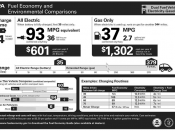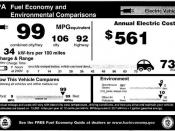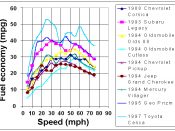When someone is interested in purchasing a new car for the first time or not, many things are taken into consideration before a final car is selected. Many aspects of the car that are looked at and that can be related to economics are the safety specifications, warranties, fuel economy, and price. Each of these, along with many others, plays a role in the selection process of purchasing a new or used car. Many times when people decide to buy a car they often mistake the car for an investment, when fact it is a liability: "If you want to spend $15,000 on a car - then borrow the $15,000 at 9% - you will pay 71.23% more each month ($311 vs $182) than if you save monthly for the car earning 12%"ÃÂ (http://www.westga.edu/~lvg/consumer/Cars/borsav.html).
Safety specifications are extremely important when it comes to buying a car. It must be compared to the price of the car and also the intrinsic value it has.
Warranties can determine whether or not the car can be maintained and the financial risks it holds if the car were to brake down. The fuel economy of a car is important relating to the gas the car will consume. If the car uses gasoline proficiently, then more money will be saved on fuel.
The price of a car is very important. The sticker price of a car can generally be bargained. The car's down payment can effect whether or not the car is affordable. The interest rate on borrowing money and also paying off the car in whole compared to a monthly basis can be significant. Buying a new car vs. an old car has its own advantages and disadvantages as well: "You would expect to pay more in annual maintenance costs on an older...


